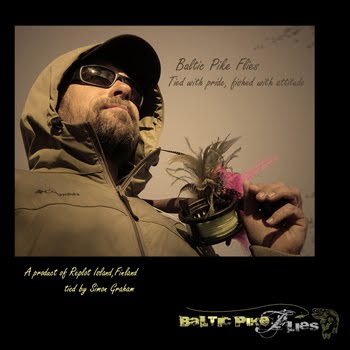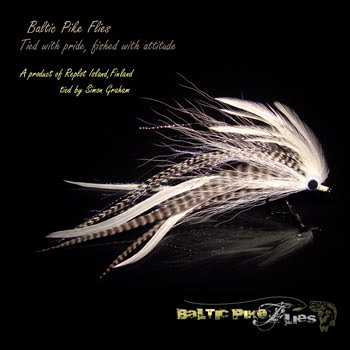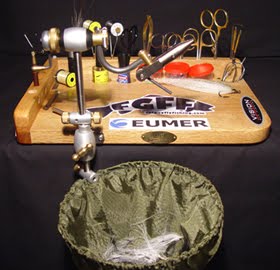 I spent the whole of last season fishing with a 120lb mono trace on one of my rod set ups and was pleasantly surprised how well they stood up.Out of the 52 wire traces I replaced on my other rig, I only changed 12 mono traces.....which I thought extremely cost effective and thought maybe it was the way forward. Thats until I put the tournament on in May and saw first hand why I had always used a wire trace to a heavy mono trace. One of the English chaps who's been fly fishing for pike for many years and been using his own hand made 120 lb mono traces, had never had a pike bite through one in 5 yrs until the 3rd day of the tournament and he lost a very very big fish, not once but twice, which could have won him and his team mate the tournament. Since hearing that story I have replaced my other rig with another wire trace and will never ever use another mono trace ever again. Those of you that do use a mono trace should seriously consider changing back to a wire set up before you loose that fish of a lifetime.
I spent the whole of last season fishing with a 120lb mono trace on one of my rod set ups and was pleasantly surprised how well they stood up.Out of the 52 wire traces I replaced on my other rig, I only changed 12 mono traces.....which I thought extremely cost effective and thought maybe it was the way forward. Thats until I put the tournament on in May and saw first hand why I had always used a wire trace to a heavy mono trace. One of the English chaps who's been fly fishing for pike for many years and been using his own hand made 120 lb mono traces, had never had a pike bite through one in 5 yrs until the 3rd day of the tournament and he lost a very very big fish, not once but twice, which could have won him and his team mate the tournament. Since hearing that story I have replaced my other rig with another wire trace and will never ever use another mono trace ever again. Those of you that do use a mono trace should seriously consider changing back to a wire set up before you loose that fish of a lifetime.
Wednesday, 6 October 2010
Mono vs wire
 I spent the whole of last season fishing with a 120lb mono trace on one of my rod set ups and was pleasantly surprised how well they stood up.Out of the 52 wire traces I replaced on my other rig, I only changed 12 mono traces.....which I thought extremely cost effective and thought maybe it was the way forward. Thats until I put the tournament on in May and saw first hand why I had always used a wire trace to a heavy mono trace. One of the English chaps who's been fly fishing for pike for many years and been using his own hand made 120 lb mono traces, had never had a pike bite through one in 5 yrs until the 3rd day of the tournament and he lost a very very big fish, not once but twice, which could have won him and his team mate the tournament. Since hearing that story I have replaced my other rig with another wire trace and will never ever use another mono trace ever again. Those of you that do use a mono trace should seriously consider changing back to a wire set up before you loose that fish of a lifetime.
I spent the whole of last season fishing with a 120lb mono trace on one of my rod set ups and was pleasantly surprised how well they stood up.Out of the 52 wire traces I replaced on my other rig, I only changed 12 mono traces.....which I thought extremely cost effective and thought maybe it was the way forward. Thats until I put the tournament on in May and saw first hand why I had always used a wire trace to a heavy mono trace. One of the English chaps who's been fly fishing for pike for many years and been using his own hand made 120 lb mono traces, had never had a pike bite through one in 5 yrs until the 3rd day of the tournament and he lost a very very big fish, not once but twice, which could have won him and his team mate the tournament. Since hearing that story I have replaced my other rig with another wire trace and will never ever use another mono trace ever again. Those of you that do use a mono trace should seriously consider changing back to a wire set up before you loose that fish of a lifetime.
Subscribe to:
Post Comments (Atom)


























3 comments:
Great topic Simon! I kinda feel like it's the grass is greener on the other side scenario... I know Brad Bohen as well as I only fish Fluorocarbon bite guards as do a number of friends... But I also have one friend that only fishes wire so... I guess it's what you have confidence in.
I've had just about as many wire or snap swivels fail then cuts on Fluoro. Is there a reasons your using mono instead of fluoro?
Again great topic Si! I think it's a catch 22.
Hey Simon: With all the pike fishing you do, have you ever compared the number of strikes per man-hour of fishing you get with different leader materials?
I ask because fishing for muskie, I've noticed a huge difference. On a recent trip, fishing the same flies and covering the same water, we found that flouro leader setups got 5 times more strikes than wire.
This could have been due to increased flexibility and action imparted to the fly by 40lb FC, or something else entirely.
At any rate, while you do run the risk of getting cut, around these parts you also seem to get more strikes and ultimately more fish in the boat. What are your thoughts?
Hello Simon! Love your blog, always full of interesting new ideas and some nice pike patterns too. I love fishing pike on the fly about 200 km south of your location.
About this particular topic: This spring I also lost my record pike partly because of the bite tippet material. I had one brand of knottable steel braid as bite tippet.
This material has served its purpose very well until this and I immediately switched to titanium wire leaders. This stiff material seems to be almost indestructible but it also seems that the number of strikes is much lower.
So during this fall I have moved back to knottable stuff, this time to much more tightly spun stuff that seems to be more toothproof.
Common problem with all these flexible materials seems to be that they are surprisingly easy to break when sufficient amount of tension is applied to them. You can test this by trying to cut the material with bad scissors, when you keep the ends loose, the cutting is very difficult. Put enough tension on the ends and all of a sudden, it cuts like a charm.
Where this all ends up? Well, the material that has worked brilliantly so far, fails miserably when you manage to hook the fish of your life.
Keep up the good work, thumbs up!
Post a Comment